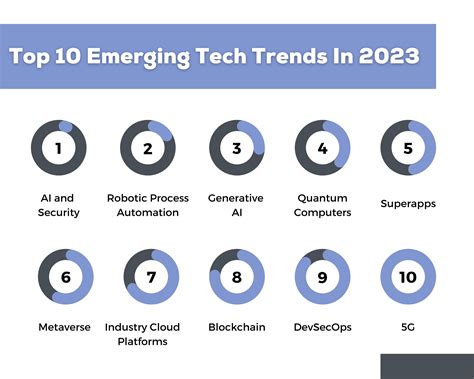In today's fast-paced world, technology is evolving at an unprecedented rate. As we navigate the complexities of the digital age, it's essential to stay ahead of the curve and understand the emerging trends that will shape the future. From artificial intelligence to the Internet of Things, several technologies are gaining momentum, poised to revolutionize industries and transform the way we live and work.
The importance of staying informed about emerging tech trends cannot be overstated. Not only can it help businesses and individuals stay competitive, but it can also enable us to adapt to the changing landscape and capitalize on new opportunities. In this article, we'll delve into five emerging tech trends that are worth watching, exploring their potential applications, benefits, and what they might mean for the future.
1. Extended Reality (XR)

Extended Reality (XR) is a term that encompasses Virtual Reality (VR), Augmented Reality (AR), and Mixed Reality (MR). These technologies are changing the way we interact with information, environments, and each other. XR has the potential to transform industries such as education, healthcare, and entertainment, enabling new forms of immersive storytelling and experiential learning.
For instance, XR can be used to create interactive, 3D models of the human body, allowing medical students to explore anatomy in unprecedented detail. Similarly, XR can enable architects to design and visualize buildings in a more immersive and interactive way, reducing the need for physical prototypes.
Benefits of XR
- Enhanced engagement and immersion
- Improved training and education
- Increased accessibility and inclusivity
- New forms of storytelling and experiential marketing
2. Quantum Computing

Quantum computing is a new paradigm for computing that uses the principles of quantum mechanics to perform calculations. This technology has the potential to solve complex problems that are currently unsolvable with traditional computers, such as simulating complex systems, optimizing complex processes, and cracking complex codes.
For example, quantum computers can be used to optimize complex logistics and supply chain management, reducing costs and improving efficiency. Similarly, quantum computers can be used to simulate complex systems, such as weather patterns and financial markets, enabling more accurate predictions and decision-making.
Benefits of Quantum Computing
- Exponential increase in computing power
- Ability to solve complex problems
- Improved optimization and simulation
- Enhanced security and encryption
3. Artificial General Intelligence (AGI)

Artificial General Intelligence (AGI) refers to a type of artificial intelligence that can perform any intellectual task that a human can. AGI has the potential to revolutionize industries such as healthcare, finance, and education, enabling machines to learn, reason, and apply knowledge in a more human-like way.
For instance, AGI can be used to develop personalized medicine, enabling doctors to tailor treatments to individual patients based on their unique genetic profiles and medical histories. Similarly, AGI can be used to develop more effective educational systems, enabling machines to adapt to individual learning styles and abilities.
Benefits of AGI
- Ability to perform any intellectual task
- Improved decision-making and problem-solving
- Enhanced learning and adaptation
- Increased productivity and efficiency
4. Blockchain and Distributed Ledger Technology

Blockchain and Distributed Ledger Technology (DLT) is a new paradigm for data storage and transmission that enables secure, transparent, and decentralized transactions. This technology has the potential to transform industries such as finance, supply chain management, and cybersecurity, enabling more secure and efficient transactions.
For example, blockchain can be used to develop secure and transparent voting systems, enabling citizens to verify the integrity of electoral processes. Similarly, blockchain can be used to develop more secure and efficient supply chain management systems, enabling companies to track and verify the origin and movement of goods.
Benefits of Blockchain and DLT
- Secure and transparent transactions
- Decentralized and distributed data storage
- Improved efficiency and productivity
- Enhanced security and integrity
5. The Internet of Things (IoT)

The Internet of Things (IoT) refers to the network of physical devices, vehicles, and other items that are embedded with sensors, software, and connectivity, enabling them to collect and exchange data. This technology has the potential to transform industries such as manufacturing, transportation, and energy management, enabling more efficient and sustainable operations.
For instance, IoT can be used to develop smart cities, enabling cities to optimize energy consumption, traffic flow, and waste management. Similarly, IoT can be used to develop more efficient and sustainable manufacturing systems, enabling companies to optimize production and reduce waste.
Benefits of IoT
- Improved efficiency and productivity
- Enhanced sustainability and energy management
- Increased connectivity and interoperability
- New forms of data-driven decision-making





As we've explored in this article, emerging tech trends have the potential to transform industries, revolutionize the way we live and work, and create new opportunities for growth and innovation. By staying informed about these trends and understanding their potential applications and benefits, we can position ourselves for success in the digital age.
What is the most promising emerging tech trend?
+Extended Reality (XR) is one of the most promising emerging tech trends, with potential applications in education, healthcare, and entertainment.
How will Artificial General Intelligence (AGI) impact the workforce?
+AGI has the potential to automate many tasks, but it also creates new opportunities for human-AI collaboration and enables machines to learn, reason, and apply knowledge in a more human-like way.
What is the potential impact of Blockchain and Distributed Ledger Technology on cybersecurity?
+Blockchain and DLT have the potential to enable more secure and transparent transactions, reducing the risk of cyber attacks and data breaches.
We hope this article has provided valuable insights into the emerging tech trends that are shaping the future. As we continue to navigate the complexities of the digital age, it's essential to stay informed, adapt to change, and capitalize on new opportunities.
